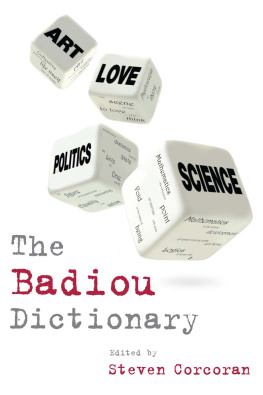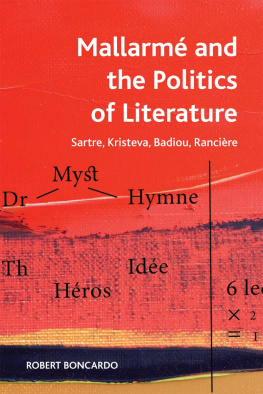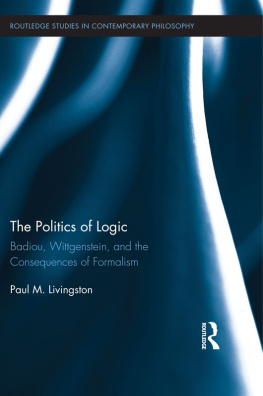Mallarm
INSOLUBILIA: NEW WORK IN CONTEMPORARY PHILOSOPHY
Series Editors: A.J. Bartlett, Justin Clemens and Jon Roffe
Insolubilia are problems that one cannot solve, cannot salve and cannot savebut which nonetheless cannot be avoided. This series publishes works that engage with the problems that deserve the name contemporary because they arise in and pertain specifically to our contemporary situation. These necessarily novel works will explore foundational questions in philosophy from a new perspective, offer new syntheses of previously disparate fields of investigation with an eye to the contemporary problematic, and think through in a rigorous way the relationship between previously heterogeneous concerns that have now come into contact (e.g. critical theory and the environment; philosophy and the market; neuroscience and poetry). Insolubilia is accordingly a series that publishes the latest works in continental philosophy that incarnate, present, and engage the insolubles of our time.
Titles in the Series:
Mallarm: Rancire, Milner, Badiou by Robert Boncardo and Christian R. Gelder
Mallarm
Rancire, Milner, Badiou
Robert Boncardo
and
Christian R. Gelder

Published by Rowman & Littlefield International Ltd
Unit A, Whitacre Mews, 26-34 Stannary Street, London SE11 4AB
www.rowmaninternational.com
Rowman & Littlefield International Ltd.is an affiliate of Rowman & Littlefield
4501 Forbes Boulevard, Suite 200, Lanham, Maryland 20706, USA
With additional offices in Boulder, New York, Toronto (Canada), and Plymouth (UK)
www.rowman.com
Robert Boncardo and Christian R. Gelder 2017
All rights reserved. No part of this book may be reproduced in any form or by any electronic or mechanical means, including information storage and retrieval systems, without written permission from the publisher, except by a reviewer who may quote passages in a review.
British Library Cataloguing in Publication Data
A catalogue record for this book is available from the British Library
ISBN: HB 978-1-7866-0310-4
PB 978-1-7866-0311-1
Library of Congress Cataloging-in-Publication Data Available
ISBN: 978-1-78660-310-4 (cloth : alk. paper)
ISBN: 978-1-78660-311-1 (pbk. : alk. paper)
ISBN: 978-1-78660-312-8 (electronic)
 The paper used in this publication meets the minimum requirements of American National Standard for Information SciencesPermanence of Paper for Printed Library Materials, ANSI/NISO Z39.48-1992.
The paper used in this publication meets the minimum requirements of American National Standard for Information SciencesPermanence of Paper for Printed Library Materials, ANSI/NISO Z39.48-1992.
Printed in the United States of America
Contents
We would like to thank the editors of InsolubiliaA.J. Bartlett, Justin Clemens and Jon Roffefor their advice, their encouragement, their friendship.
ALAIN BADIOU
| AFP | The Adventure of French Philosophy |
| BE | Being and Event |
| C | Conditions |
| HI | Handbook of Inaesthetics |
| IE | Is It Exact that All Thought Emits a Throw of Dice? |
| LW | Logics of Worlds |
| ML | Mark and Lack |
| MfP | Manifesto for Philosophy |
| NN | Number and Numbers |
| TS | Theory of the Subject |
| TO | Briefings on Existence: Short Treatise on Transitory Ontology |
STPHANE MALLARM
| CP | Collected Poems: A Bilingual Edition |
| D | Divagations |
| PV | The Poems in Verse |
QUENTIN MEILLASSOUX
| EP | Badiou and Mallarm: The Event and the Perhaps |
| NS | The Number and the Siren |
JEAN-CLAUDE MILNER
| CO | Constats |
| EVI | Existe-t-il une vie intellectuelle en France? |
| FLL | For the Love of Language |
| MP | Mallarm Perchance |
| MT | Mallarm au tombeau |
| NI | Les noms indistincts |
| OC | Luvre claire |
| TT | The Tell-Tale Constellations |
| UE | LUniversel en clats: Court trait politique 3 |
JACQUES RANCIRE
| MS | Mute Speech |
| PL | The Politics of Literature |
| PS | Mallarm: The Politics of the Siren |
The Subject to Which Everything is Attached
Everything depends on the point of view adopted. This, however, is not only multiple, but indeed, it is only through a succession of points of view, linked one to the other, that any conviction can take form.
Mallarm, Les mots anglais
This book contains a series of interviews with three major figures in contemporary continental philosophy: Jacques Rancire, Jean-Claude Milner, and Alain Badiou. What unifies this collection is that we ask each thinker to reflect upon their lifelong engagement with the late nineteenth-century poet Stphane Mallarm. Rancire, Milner, and Badiou have each been writing since the 1960s and 1970s, and their ideas about the poet can be traced from their earliest publications to the present day. However, what we hope this introduction and the interviews that follow show is that each thinker does not limit himself to commenting on Mallarm as an historical figure. In fact, their interpretations of the poet intersect with more general debates that have occupied French thinkers for the last half centurydebates about the formal distinction between poetic and ordinary language, about literatures relation to the nature and possibility of radical political change, and about poetrys ancient rivalry with mathematics. For the three thinkers interviewed in this collection, Mallarms role in twentieth-century philosophy seems to play out a remark the poet himself made about literary art: that it was the subject to which everything is attached (D 195). In the first half of this introduction, we shall examine Rancire, Milner, and Badious work on Mallarm from the perspective of their conceptions of poetic language and mathematics. In the second, we turn to their polemic over the political significance of the poets work.
MALLARM THE SCIENTIST, MALLARM THE MATHEMATICIAN?
Thanks to his reputation as both a linguistically innovative poet and a theoretician of language in his own right, Mallarm has long been a privileged object for linguists and literary theorists, not to mention for philosophers concerned with the power of poetry. At the close of her translation of Divagations (2009), Barbara Johnson writes that each of Mallarms infamous critical poems is a lesson in how language works. Transcending the limits of a stultifying communicational language,
For literary theorists and philosophers, on the other hand, Mallarm has frequently provided an object lesson in poetry or literatures power. Perhaps because of this, a series of slogan-like formulations have been extracted from their original context, as Thierry Roger has recently lamented.
More curious still is the long-standing tendency to read some conception of mathematics alongside Mallarm. As Roger notes, the first Belgian and French reviews of Mallarms 1897 masterpiece Un coup de ds were mostly concerned with the quasi-mathematical nature of some of the poems images. He writes, given its title, the first considerations on the
















 The paper used in this publication meets the minimum requirements of American National Standard for Information SciencesPermanence of Paper for Printed Library Materials, ANSI/NISO Z39.48-1992.
The paper used in this publication meets the minimum requirements of American National Standard for Information SciencesPermanence of Paper for Printed Library Materials, ANSI/NISO Z39.48-1992.